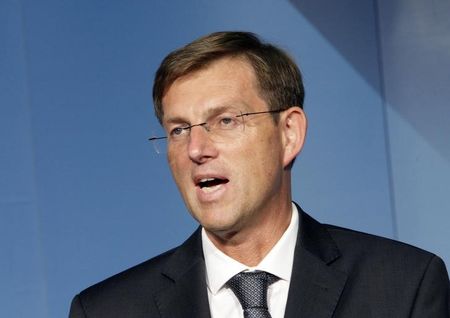By Marja Novak
LJUBLJANA (Reuters) - Slovenia's next ruling party picked former finance minister Dusan Mramor on Thursday to head the finance ministry in a new center-left government that is due to be formed within weeks and aims to steer the euro zone member out of its economic crisis.
Mramor is a 60-year-old economics professor who presided over tax hikes in 2002-2004 as finance minister in a previous center-left government.
He faces the tough task of cutting Slovenia's budget deficit to 3 percent of national output in 2015 from about 4.2 percent this year, under a plan agreed with the European Union after the tiny ex-Yugoslav republic narrowly avoided seeking an international bailout for its debt-laden banks late last year.
Prime Minister-designate Miro Cerar, whose newly-formed SMC party claimed a convincing win in a snap election in July, said late on Wednesday he would invite into his new government the Desus pensioners' party and the center-left Social Democrats.
The three-party coalition would control 52 of parliament's 90 seats, offering the prospect of political stability after five or six years of political and financial crisis.
Cerar's party issued a statement saying it believed Mramor, as finance minister, "will help significantly towards the consolidation of public finances and a gradual increase in the quality of life in Slovenia".
Analysts said they expected Mramor to forge ahead with privatization as his best tool to reduce the budget deficit.
"His main task will be to cut the budget deficit to three percent next year, which will be very difficult," said Saso Stanovnik, chief economist at investment firm Alta Invest.
"I expect he will push forward with privatization and will sell Telekom Slovenia as that would bring in a large sum."
Mramor could not immediately be reached for comment.
PRIVATISATION UNCERTAINTY
Cerar has come out against the sale of important strategic firms such as telecoms operator Telekom Slovenia, airport Aerodrom Ljubljana, port Luka Koper and the railways.
But the sales of Telekom and Aerodrom are in their final stages and Cerar has said he will not stop them if doing so would risk hurting Slovenia's credibility with investors.
Both Desus and the Social Democrats are hostile to privatization, a process that successive governments since independence in 1991 have ducked, leaving some 50 percent of the economy controlled by the state.
Slovenia's vital exports hit a wall with the onset of the global crisis, driving up bad loans. The previous government poured some 3.3 billion euros of state money into the teetering banks last December.
Cerar, a former law professor and adviser to the Slovenian parliament, won July's election just six weeks after entering politics as a fresh face untainted by the corruption scandals and crises that have dented support for the traditional parties.
President Borut Pahor nominated Cerar as prime minister on Tuesday and parliament is expected to confirm his nomination on August 25.
Cerar will have to nominate his cabinet in early September.
Speaking late on Wednesday, Cerar said his party had decided against inviting the center-left party of outgoing Prime Minister Alenka Bratusek into the coalition, blaming her former party for causing a political crisis in the country.

Slovenia held its second early election in a row on July 13. The election was prompted by Bratusek's resignation as prime minister in May after she lost the battle for leadership of her Positive Slovenia party. Bratusek later quit the party.
(Editing by Gareth Jones)
